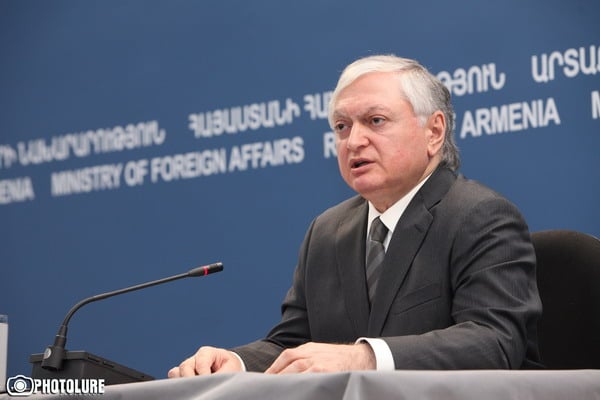On May 24, the Acting Foreign Minister Edward Nalbandian participated in the International Ministerial Conference in Madrid entitled “Victims of Ethnic and Religious Violence in the Middle East”, which was organized by Spain and Jordan.
Rights of the ethnic and religious minorities of the Middle East, issues related to the protection of their identity, preservation of traditional diversity of the region have always been in the focus of Armenia’s attention, which tries through active participation in various international fora to bring its contribution to the efforts of the international community on this important issue.
The conference brought together nearly sixty high-level delegations from international organisations and states.
The heads of the delegations participating at the Ministerial conference were received by the King Felipe VI of Spain.
The Plenary session of the Conference was opened by the speech of Edward Nalbandian, Head of the Foreign Ministry of the Republic of Armenia.
In his speech, the head of the Foreign Ministry of Armenia noted.
“Dear Colleagues,
I would like to thank Spanish hosts along with Jordan for their efforts to follow up the discussions on this challenging issue. Armenia continues to actively contribute to international efforts in this regard.
For centuries the Armenian nation has constituted a part of the multicultural and multi-religious mosaic of the region. This diversity of the Middle East – deeply rooted in the traditions of coexistence and tolerance – was once a remarkable asset not just in civilizational terms but also security wise. The mass exodus from this region of the most vulnerable groups, representing different ethnic and religious communities is largely an outcome of inhumane ideology and atrocities perpetrated by terrorist organizations.
Thus, safeguarding the remnants of diversity and tolerance in the Middle East is important for restoration of regional safety and security. It may contribute to the prevention of the spillover effect that threatens the neighboring regions and far beyond. The terrorist acts in Europe are illustrative in this regard. The phenomenon of the terrorists returning from the Middle East battlefields threatens not just the security of the countries of their origin, but may become a destabilizing factor in other regions, stimulating crisis situations and regional conflicts. The Daesh style beheadings and other despicable atrocities are already not limited just to the Middle East.
It should be made clear once and again that religion has nothing to do with the violence. What we are countering here are crimes against civilization perpetrated by Daesh and other terrorist groups. Barbarism has declared a war against the civilized world. Indeed, the threat that the ethnic and religious communities of the Middle East face, is not merely a physical, but also a civilizational challenge. To what extent the international community is able to unite and jointly fight against this evil would demonstrate to what extent it is ready to protect its own civilizational values.
It is in this spirit that Armenia expressed its resolve to join the international efforts in eliminating this scourge.
I share the opinion of my Jordanian colleague, that from one side there is a terrorist minority, and from other side the whole civilized world. I would like to underline that the efforts of civilized majority should be first and foremost directed at countering the breeding ground and root causes of terrorism.
Dear Colleagues,
It is not a coincidence that the Hashemite Kingdom of Jordan has a leading role in countering ethnic and religious violence in the Middle East. During the Armenian Genocide the Emir of Hashemite dynasty of Mecca Hussein Bin Ali issued a decree calling to protect Armenians, as they protect themselves and their children. The values of compassion and care are not outdated. They are well grounded in the century long traditions of the Middle East and should serve as an example for the current protection efforts.
The Syrian crisis has deepened divisions in the Middle East and beyond. We may hold different views on its underlying causes, dynamic or the ways of the settlement but we should stand on the same footage on the humanitarian issues. Any efforts to protect and rehabilitate victimized communities should be supported irrespective of the political and religious differences.
Next year we will mark the 70th anniversary of the adoption of the Genocide Convention. The actions of terrorists against ethnic and religious groups indicate the relevance of the Convention which clearly establishes the punishable actions, including the complicity. Any support to the terrorist entities involved in identity based crimes should be viewed under this Convention.
The violence has not bypassed Syrian Armenians, many of whom lost their lives in terrorist attacks. The Armenian settlements, churches, schools and cultural institutions were destroyed. One hundred years ago Armenian refugees found shelter in many Arab countries after the Armenian Genocide. Today thousands of Armenians, together with other people of the Middle East, again are forced to abandon their places of residence.
Armenia has received more than twenty two thousand refugees only from Syria, making our country the third largest recipient of Syrian refugees in Europe on per capita basis. We have also tried to reach out to the people who need assistance in Syria by continuous provision of humanitarian aid.
Throughout the recent Constitutional and Legislative Reforms Armenia enabled its four main minorities to ensure an assigned seat in the Parliament. Three out of these groups – namely Yazidis, Assyrians and Kurds have been subjected to the identity based violence in Syria and Iraq. We have a long shared history with these people. Today Armenia contributes to the international efforts for the protection of the Armenian and other vulnerable communities in the Middle East.
The quest of preserving, protecting and promoting ethnic and religious plurality and diversity of the Middle East is of high importance for civilizational, humanitarian and security reasons that make it one of the most challenging issues of the modern times.
Thank you”.
























































